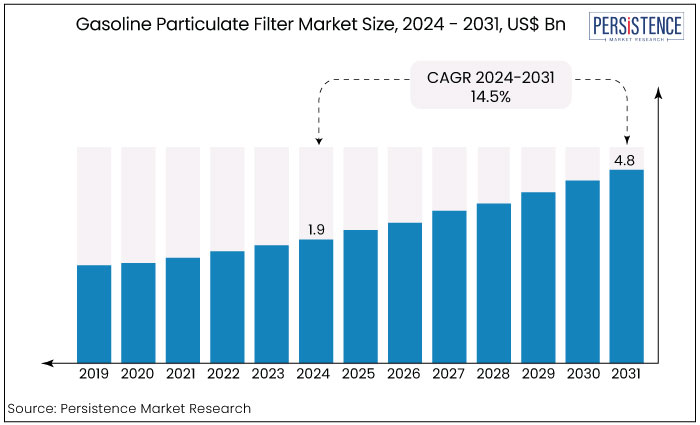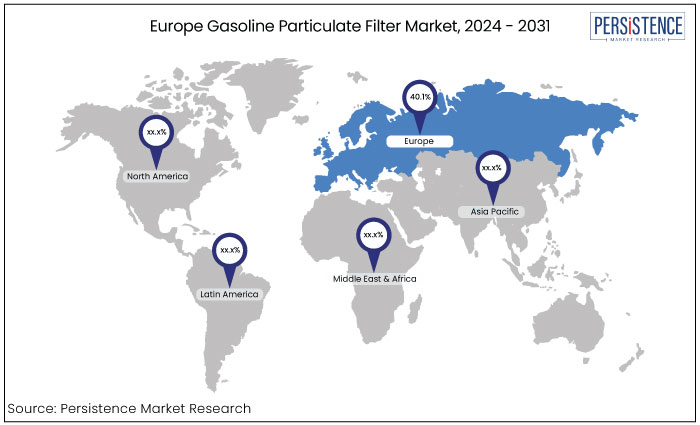Industry: Automotive & Transportation
Published Date: October-2024
Format: PPT*, PDF, EXCEL
Delivery Timelines: Contact Sales
Number of Pages: 182
Report ID: PMRREP34875
The gasoline particulate filter market is estimated to increase from US$ 1.9 Bn in 2024 to US$ 4.8 Bn by 2031. The market is projected to record a CAGR of 14.5% during the forecast period from 2024 to 2031.
Gasoline particulate filters (GPFs) are becoming increasingly popular due to stringent emission regulations and high consumer demand for clean automotive technologies. The market is also set to be driven by rapid expansion of hybrid and electric vehicle segments, which require advanced emission control technologies.
The International Energy Agency (IEA), for example, states that about one in five vehicles sold globally in 2023 were electric, which showcased a surge of 4% from 2020. Approximately 3 million electric vehicles (EVs) were sold in the first quarter of 2024.

The U.S. Energy Information Administration (EIA), on the other hand, mentioned that in the first quarter of 2024, sales of hybrid electric vehicles accounted for around 8.6% of the country's light-duty market. The numbers are projected to soar through 2031, thereby creating a favorable environment for growth.
Key Highlights of the Market
|
Market Attributes |
Key Insights |
|
Market Size (2024E) |
US$ 1.9 Bn |
|
Projected Market Value (2031F) |
US$ 4.8 Bn |
|
Global Market Growth Rate (CAGR 2024 to 2031) |
14.5% |
|
Historical Market Growth Rate (CAGR 2019 to 2023) |
10.4% |
|
Region |
Market Share in 2024 |
|
Europe |
40.1% |
Europe is recognized as a leader in setting regulatory standards and is expected to account for 40.1% of the industry's share in 2024. It is flourishing, particularly when it comes to environmental protection and safety. As of September 2022, the minimum emission standards in the region are Euro 6 for diesels and Euro 4 for petrol vehicles. This commitment to high standards creates a unique opportunity for innovative and eco-friendly gasoline particulate filter products that meet these rigorous requirements.
As consumers and governments prioritize sustainability, manufacturers are encouraged to develop advanced filtration technologies. These are set to help comply with strict regulations and contribute to clean air and reduced emissions.

Increasing focus on green initiatives in Europe means a booming market for products that enhance vehicle efficiency while minimizing environmental impact. This dynamic landscape positions Europe as a key hub for developing and adopting cutting-edge gasoline particulate filters that comply with modern ecological goals.
|
Region |
Market Share in 2024 |
|
North America |
31% |
North America stands out from other regions due to its early adoption of cutting-edge technologies and robust consumer spending. It will likely to create a surging demand for gasoline particulate filter products.
North America is set to capture around 31% of the total gasoline particulate filter market share. The region's consumers are often eager to embrace advancements that enhance vehicle performance and environmental sustainability.
Supportive government policies aimed at reducing emissions and promoting clean technologies further play a pivotal role in bolstering growth. The National Highway Traffic Safety Administration (NHTSA) and the Environmental Protection Agency (EPA), for example, have set standards based on the Clean Air Act (CAA).
|
Category |
Market Share in 2024 |
|
Type - Cordierite Gasoline Particulate Filters |
66.94% |
The gasoline particulate filter industry is categorized into two main types, namely, ceramic and cordierite filters. Among these, cordierite gasoline particulate filters are expected to dominate the global landscape with 66.94% of the total market share in 2024.
Cordierite filters are gaining high popularity due to their extensive application in different types of vehicles. Their ability to capture harmful particulate matter emitted by direct injection gasoline engines help enhance air quality.
One of the key advantages of cordierite filters is their cost-effectiveness in production, alongside a range of valuable technical benefits. Recently, Bosch made a significant move by introducing a comprehensive filtration system. It combines cordierite particle filters with advanced regeneration management software, known as DPF-AC. This innovation is set to elevate vehicle emission control standards, making it a noteworthy development in the automotive industry.
The three main vehicle types in the market include passenger cars, light commercial vehicles, and heavy commercial vehicles. Currently, passenger cars account for the largest share, and this trend is set to continue in the coming years.
Several factors contribute to growth of the passenger cars segment. A few of these include rising living standards, improved road infrastructure, and increased disposable income, particularly in countries like India, China, and Japan.
Most passenger cars are equipped with gasoline engines, which necessitate the use of gasoline particulate filters to manage fuel emissions effectively. Furthermore, stringent government regulations aimed at reducing emissions and enhancing fuel efficiency are likely to boost the segment. Several initiatives to ensure driver and passenger safety are also augmenting expansion of the segment.
The gasoline particulate filter industry analysis shows that the industry is growing steadily and is influenced by a wide range of trends and factors. The ability of these filters to help comply with stringent environmental regulations to reduce air pollution is set to create new growth opportunities.
The rise of stringent emission standards across various regions, especially in Europe and North America, is anticipated to compel manufacturers to adopt GPFs in their designs. Additionally, innovations in filter materials and regeneration techniques are likely to enhance the efficiency and longevity of these systems.
The trend toward electrification in the automotive sector is also expected to influence adoption. This is attributed to the increasing need for effective particulate management in hybrid and plug-in hybrid vehicles to meet emissions targets.
The gasoline particulate filter market overview observes that it experienced considerable growth from 2019 to 2023, valued at approximately 10.4%. This period witnessed a surging adoption of GPFs, primarily driven by stringent emission regulations and a growing focus on reducing vehicular pollution.
The automotive industry's shift toward more sustainable technologies, including direct fuel injection systems, amplified the need for effective particulate matter reduction solutions. Manufacturers have been prompted to innovate and enhance filter efficiency, leading to significant advancements in GPF technology.
The GPF market is projected to reach 14.5% between 2024 and 2031. Continued regulatory pressure and rise of hybrid and electric vehicles are set to necessitate efficient emission control strategies.
Increased consumer awareness regarding environmental issues will likely drive market players to create clean automotive solutions. As the industry evolves, ongoing research and development efforts are set to help improve GPF performance. These are also projected to address the cost-effectiveness aspect, positioning the market for robust expansion in the coming years.
Stringent Regulatory Landscape to Encourage Adoption
One of the primary drivers for the gasoline particulate filter market growth is the implementation of stringent emission regulations by governments worldwide. Authorities are increasingly prioritizing air quality and environmental sustainability, resulting in rigorous standards for vehicle emissions, especially those concerning particulate matter.
Regions like Europe and North America have already established comprehensive regulations that mandate the incorporation of advanced emission control technologies, including GPFs, in new vehicles. This regulatory landscape compels automakers to adopt GPF solutions to comply with legal requirements and avoid penalties.
As regulatory frameworks continue to evolve and tighten, demand for GPFs is expected to rise. It will likely push the market as manufacturers innovate to meet these stringent standards while ensuring vehicle performance and efficiency.
Automakers Focus on Offering Sustainable Vehicles Equipped with GPFs
Increasing consumer awareness regarding environmental issues is significantly driving the gasoline particulate filter industry. As the public becomes informed about the impact of vehicle emissions on air quality and climate change, there is a increasing preference for clean automotive technologies.
Consumers are actively seeking vehicles equipped with advanced emission control systems, including GPFs, to minimize their carbon footprint. This trend is particularly notable among environmentally conscious buyers and urban populations facing high pollution levels.
Automakers are hence responding to this demand by integrating GPFs into their vehicle designs, promoting them as part of their commitment to sustainability. As the market landscape shifts toward green alternatives, demand for GPF-equipped vehicles will continue to rise, propelling growth.
GPF Manufacturers Innovate Sensor Technology to Enhance Performance
Technological innovations in gasoline particulate filter design and efficiency serve as a key driver in the global market. Continuous research and development activities are leading to innovations that enhance the performance and functionality of GPFs.
New materials, such as advanced ceramics and catalysts, are being employed to improve filtration efficiency, regeneration processes, and durability. These innovations allow GPFs to capture a high percentage of particulate matter while minimizing backpressure on the engine, which is crucial for maintaining vehicle performance.
Advancements in sensor technology are set to enable better monitoring and management of filter conditions, optimizing regeneration cycles. As manufacturers leverage these technological improvements, they can offer more effective and reliable GPF solutions, driving adoption rates.
Demand for Costly GPF-equipped Vehicles May Decline among Budget-conscious Consumers
One significant factor impeding the gasoline particulate filter industry is the high manufacturing cost associated with these advanced emission control systems.
The materials used in GPFs, such as specialized ceramics and catalysts, can be expensive, leading to increased production costs for manufacturers. This financial burden can be passed on to consumers, making GPF-equipped vehicles less attractive in a competitive automotive market. Additionally, the complexity of integrating GPFs into existing vehicle designs can escalate costs, potentially limiting their widespread adoption, especially in budget-conscious segments.
Limited Consumer Awareness May Hamper Investments in GPF Technology
A significant factor hindering the gasoline particulate filter market is the lack of consumer awareness regarding the benefits and importance of GPFs. Several consumers need to be made aware of the role of GPFs in reducing particulate emissions and improving air quality.
The lack of awareness can lead to a lower demand for vehicles equipped with GPF technology, as consumers may prioritize other features over emission control systems. Consequently, automakers may be less inclined to invest in GPF integration, slowing market growth and innovation in clean automotive technologies.
Booming Hybrid and Electric Vehicle Markets to Cultivate New Prospects
A significant future opportunity for gasoline particulate filter industry expansion lies in the sales of hybrid and electric vehicles. As automakers develop hybrid models that utilize both gasoline engines and electric powertrains, integrating GPFs becomes essential to meet stringent regulations. These vehicles often require advanced emission control solutions to manage particulate emissions effectively.
As governments worldwide promote the adoption of hybrids and EVs through incentives and infrastructure development, demand for GPFs is expected to rise. This transition presents manufacturers with an opportunity to innovate and refine GPF technologies. It will likely cater to the evolving needs of the automotive industry and contribute to a clean environment.
Emergence of Novel Porous Ceramics and Catalytic Coatings to Expand Horizons
Ongoing advances in GPF technology and materials present a promising opportunity for growth. Research into more efficient filtration materials, such as advanced porous ceramics and novel catalytic coatings, can enhance the performance and longevity of GPFs. These innovations help improve the capturing and reduction of particulate matter and optimize regeneration processes, resulting in lower maintenance costs for consumers.
The development of smart GPFs equipped with sensors and monitoring systems can provide real-time data on filter performance, allowing for proactive maintenance. As manufacturers invest in research and development to push the boundaries of GPF technology, there is a significant opportunity to capture a high market share.
The competitive landscape of the gasoline particulate filter industry is characterized by continuous innovations among key players. Several companies are now focusing on enhancing filter efficiency and durability to meet stringent emission regulations.
France-based Faurecia, a prominent player in the automotive technology sector, has been launching several innovative products since 2022. One of these includes a next-generation GPF that incorporates advanced filtration materials and enhanced regeneration capabilities. The product not only improves particulate matter capture but also reduces backpressure, optimizing engine performance. As competition intensifies, manufacturers are likely to invest in research and development to create cutting-edge solutions that address evolving environmental standards.
Recent Developments
|
Attributes |
Details |
|
Forecast Period |
2024 to 2031 |
|
Historical Data Available for |
2019 to 2023 |
|
Market Analysis |
US$ Million for Value |
|
Key Regions Covered |
|
|
Key Market Segments Covered |
|
|
Key Companies Profiled |
|
|
Report Coverage |
|
|
Customization & Pricing |
Available upon request |
By Type
By Vehicle Type
By Region
To know more about delivery timeline for this report Contact Sales
